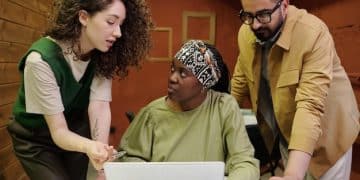Quantum Computing: Reshaping Gen Z’s Tech Future

Quantum computing promises to revolutionize various facets of technology, potentially creating new opportunities and challenges for Gen Z as they navigate their future tech landscape.
As Gen Z steps into an increasingly digital world, the emergence of quantum computing is poised to reshape their future tech landscape by offering unprecedented computational power and possibilities.
Quantum Computing: A Primer for Gen Z
Quantum computing represents a paradigm shift in computation, moving beyond the classical bits to quantum bits or qubits. This new method unlocks possibilities for solving complex problems beyond the scope of today’s technology.
For Gen Z, digital natives who have grown up in the age of technology, understanding the basics of quantum computing is becoming increasingly vital as it permeates different areas of the tech world.
How Quantum Computing Differs from Classical Computing
Classical computers store information as bits, which can be either 0 or 1. Quantum computers use qubits, which can exist in a superposition of both 0 and 1 simultaneously, allowing them to perform calculations in a fundamentally different way.
Key Concepts in Quantum Computing
Understanding superposition, entanglement, and quantum gates is essential to grasping the power of quantum computing. These concepts enable quantum computers to tackle complex calculations more efficiently than classical computers.
- Superposition: Qubits exist in multiple states simultaneously, enabling parallel calculations.
- Entanglement: Correlated qubits that affect each other irrespective of the distance between them.
- Quantum Gates: Control qubits to perform specific operations, analogous to classical logic gates.
In short, quantum computing promises exponential speedups for particular types of problems, signaling a new era in computation and its applications.
Gen Z’s Role in Quantum Innovation
As digital natives, Gen Z is exceptionally well-placed to be among the early adopters, innovators, and leaders in the next era of computing and the field of quantum computing.
Their comfort and expertise with tech, combined with their creativity, position them at the forefront of understanding and harnessing quantum technology as it develops.

Educational Opportunities and Skill Development
Gen Z can take advantage of various educational offerings, including online courses, university programs, and research opportunities, to gain quantum computing skills. Coding, mathematics, and physics are among the most useful subjects.
The Potential for Startups and Entrepreneurship
The rapidly expanding sector of quantum computing means huge potential for entrepreneurs to launch products that address real-world issues using this tech. Startups are going to be at the front of quantum innovation, from applications in finance and health care to safety and AI.
Quantum computing is creating many opportunities for Gen Z to leverage their technical skills, creativity, and entrepreneurial spirit to build future technology businesses and innovate in this fast-moving field.
Ethical Considerations of Quantum Computing for Gen Z
Alongside the numerous advantages, quantum computing does carry ethical issues that have to be taken into account. As these technologies become more prevalent, it is essential to understand and handle the possible effect on security, privacy, and societal values.
Gen Z, as the future stewards of technology, must be at the forefront of those discussions, assuring its ethical and responsible uses.
Privacy and Data Security
Quantum computers have the ability to break the encryption algorithms that safeguard much of our digital communication. This presents significant difficulties regarding the privacy and protection of data.
Job Displacement and Economic Impact
As quantum computing helps facilitate automation and improves the effectiveness of several sectors, there are anxieties about work displacement. Gen Z must think about the economic effects and have the required skills to adjust to changing job markets.
Addressing the ethical dimensions of quantum computing is crucial to assure that these advanced technologies are used safely and responsibly, safeguarding the interests of people and society as a whole.
Applications of Quantum Computing in Gen Z’s Future
Quantum computing has the ability to change a broad array of sectors that Gen Z will count on, such as health care, finance, artificial intelligence, and much more. Comprehending these applications is vital for Gen Z.
By understanding these applications, Gen Z can prepare for the changing landscape and take advantage of new opportunities across industries.

Healthcare and Medicine
Quantum computing can accelerate drug discovery, optimize treatment plans, and permit personalized medicine. Gen Z will benefit from enhanced healthcare outcomes.
Finance and Economics
Quantum computing can improve financial modeling, threat detection, and algorithm of investment strategies. Gen Z, as future investors and professionals, can harness these advantages.
Artificial Intelligence and Machine Learning
Quantum computing can enhance AI algorithms, offering new possibilities for machine learning, natural language processing, and computer vision. Gen Z will depend on enhanced AI technologies in work and life.
Comprehending and embracing these applications will put Gen Z at the forefront of innovation and allow them to make a positive impact on society.
Preparing for a Quantum-Enabled Future
To fully leverage the benefits of quantum computing, Gen Z has to prepare themselves with the instruction, abilities, and resources to navigate this disruptive technology landscape properly.
By preparing effectively, Gen Z can ensure they are at the leading edge of technology and able to handle future quantum computing challenges and opportunities.
Developing Relevant Skills and Knowledge
Gen Z must spend time establishing their skills and understanding in quantum computing, computer science, mathematics, and related fields. Online courses, coding bootcamps, and academic applications can make this easier.
Seeking Mentorship and Networking Opportunities
Connecting with professionals, researchers, and fans in the quantum computing area can provide valuable guidance and opportunities. Internships, conferences, and online communities will help grow your network and build crucial connections.
- Engage in Online Communities: Participate in groups and forums that discuss quantum computing to share ideas and keep abreast of the latest trends.
- Attend Workshops and Conferences: Join workshops and industry conferences to deepen your understanding and fulfill leaders in the field.
- Seek Mentorship: Look for mentors who will provide direction and help with your career and instructional journey.
Being ready for a quantum-enabled future needs acquiring new skills and gaining access to helpful resources, making sure that Gen Z is able to take part in and lead in the area of quantum computing.
In summary, Gen Z is in a position to utilize this technology’s potential and influence its future trajectory through instruction, preparation, and collaboration.
Overcoming Challenges in the Quantum Computing Era
While the potential of quantum computing is undeniable, it’s crucial to recognize and address the challenges that lie forward. Tackling these difficulties, Gen Z can play an important part in defining the future and assisting in making quantum computing more accessible.
Awareness and proactivity are the keys to overcoming these challenges and ensuring a more inclusive and promising quantum computing future.
Addressing the Skills Gap
Among the biggest challenges is a shortage of employees with the abilities and knowledge to operate and advance quantum computing. Gen Z can help close this space by committing themselves to relevant education and training.
Promoting Access and Inclusivity
Access to quantum computing resources and possibilities might be unequal, which intensifies gender, racial, and socioeconomic disparities. Gen Z can advocate for equal opportunities by promoting programs that support inclusivity and range.
To overcome the challenges in the quantum computing age, you have to resolve skills gaps and promote inclusivity. Gen Z might play a crucial part in forming the future of quantum computing by dealing with challenges and promoting accessibility.
| Key Aspect | Brief Description |
|---|---|
| 💡 Quantum Basics | Quantum computers use qubits, allowing for faster problem-solving. |
| 🧑💻 Gen Z’s Role | Gen Z can drive innovation through education and new ventures in quantum. |
| 🛡️ Ethical Issues | Important to address data security and economic impact in quantum era. |
| 🚀 Applications | Fields impacted include healthcare improvements and financial optimizations. |
FAQ
▼
Quantum computing uses quantum mechanics principles to perform calculations, utilizing qubits that can represent 0 and 1 simultaneously, which facilitates solving complex problems faster than classical computers.
▼
Gen Z can engage through online courses, university programs, and research opportunities. Building a foundation in computer science, mathematics, and physics is critical for quantum endeavors.
▼
Ethical issues include cybersecurity risks due to the ability to break encryption, the potential effects on work, and the need for equitable access to these technologies to avoid bias.
▼
Quantum computing is set to influence many industries such as healthcare, finance, and artificial intelligence, presenting opportunities to improve outcomes, innovate financial models, and enhance AI capabilities.
▼
To prepare, Gen Z should pursue education in relevant fields, seek mentorship from experts, participate in community forums, and stay informed about advancements to navigate this complex technological era efficiently.
Conclusion
Quantum computing has the ability to transform the tech sphere, delivering both enormous chances and significant challenges for Gen Z. By getting education, confronting ethical issues, and getting ready for the long run, Gen Z may take control of this innovative technology and shape its direction to make a better, technologically sophisticated world.





